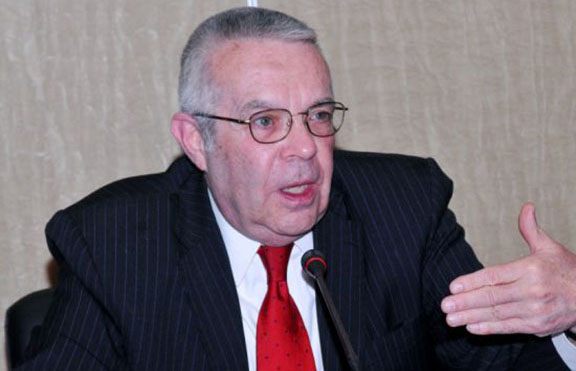
YEREVAN (ArmRadio)—“An improved version of the previous plans on peaceful settlement of Nagorno-Karabakh conflict is put on the negotiation table,” OSCE Minsk Group U.S. Co-Chair Richard Hoagland told reporters on March 27 in Yerevan. “There have been different plans during years and the one currently put on the table is the improved and amended version of the previous plans. Is this a copy of the previous plans? No. This one observes new ways, new solutions which can be acceptable for the conflicting sides,” Hoagland said.
He added that he cannot disclose the details of the plan since the sides [Artsakh Republic and Azerbaijan] have still to work on some specific points.
Hoagland noted that the foreign ministers of the parties are still to meet to prepare the meeting of the presidents. He added that when the presidents meet they can address the issues of non-agreement and reach a win-win situation.
He mentioned that they know very well where that plan comes from, but they do not call it a “Lavrov plan.”
“We call it conflict settlement plan-proposal, put on the diplomatic table,” said Hoagland.
“We are at the one year anniversary of the violence that occurred in April last year in Nagorno-Karabakh. The main message is that this anniversary should be marked at negotiating table, it should not be marked on the battlefield,” Hoagland said during Monday’s press conference in Yerevan.
“It’s time to negotiate,” he stressed. “The most important is to have political will at the top leadership on both sides to return to negotiations to find a peaceful solution. It’s up to the leaders and up to their people to decide on how to live in peace and prosperity in the future. There are plans on the table that could be discussed, and it’s time to return to the negotiating table to discuss them,” Hoagland continued.
Responding to accusations that the Minsk Group often fails to issue targeted statements, Hoagland said “I assure we do know what is going on, but because we are mediators, we have to keep a little degree of distance so that we don’t overtly offend one side or the other side. When that happens, the possibility for discussion and mediation gets closed down. We cannot allow those doors to close. We have to keep the doors open. We’ll always note when there is an issue that needs to be called attention to, but we have to be a little careful of what we say in public, even though we know what’s really happening behind those closed doors.”
Speaking about the perspectives of organizing a high-level meeting, the U.S. Co-Chair said “we’re always working to find the right conditions to bring together the Foreign Ministers or even the Presidents. There is a process going on now. The two Foreign Ministers have been meeting in Moscow separately, and we hope that in the near future the two will be able to meet in Moscow to prepare the ground for the Presidents to meet.”
“Our job tight now as Co-Chairs is to talk to all the players,” the Ambassador said. He disclosed the plans of the Co-Chairs to visit Nagorno-Karabakh to meet authorities in Stepanakert.
“We cannot allow violence to be the solution to this long-standing issue. Violence is not an answer. Violence destroys families, violence harms economies, so we have to look for the most positive solution, and our job as Co-Chairs is to continue to work together to encourage the negotiation process to continue,” he said.
“As co-chairs we try to find the most common ground for moving forward. We are facilitators. We ourselves cannot solve the issue. We can help create the conditions so that the leaders involved can make the final decision that will benefit all the people in the region,” Hoagland said.
He said that although there is a new administration in Washington, the U.S. policy remains unchanged. “We are fully committed to the Minsk Group, to the co-chairmanship process, to working quietly with all parties to find a solution that leads to peace.”
He said there are no strong differences between the three Co-Chairs, and the same goes for the governments of their respective countries. “Even if our governments disagree on certain issues, this is one issue where we really do work together extremely well.”
“The negotiation process has slowed down very dramatically, that’s why we say it’s time for the parties to return to the negating table and think how to move forward. What we want to do is to create the conditions that people feel ready and comfortable to talk again. War is the worst possible solution. What everyone needs is a solution that brings peace and prosperity to all people involved. It’s possible to find win-win situations,” Hoagland stated.


















We need an Armenian plan. Do you have one? Where is it?
Armenia needs to negotiate from a position of strength. That comes after a decisive battlefield victory, including territorial gains that include considerable portions of the oil pipelines, and a land corridor with Russia.
How come to correct an historical injustice cost so many lives and years of negotiations, negotiate what to make right something done wrong, what kind of message is sending OSCE Minsk Group to the Int’l community? that if you negotiate you can keep what is not yours.
There is no negotiation. Artsakh is already an independent country. The rest is deception.